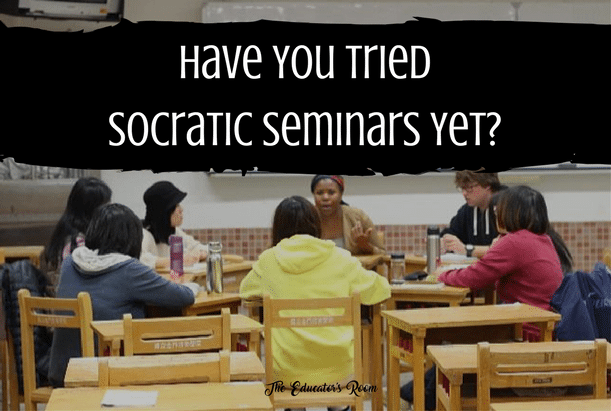Have you jumped into Socratic Seminars in your classroom yet? If not, I’ve got a few easy tips to help you get started – including a ‘real life’ demo video! If you’re already using Socratic Seminar, maybe I’ve got a way you can snazz yours up and take your students’ thinking a little bit deeper.
Why Socratic?
Socratic seminars have a discussion focus over a debate focus, allowing students a platform for thinking deeply about text, images, or video. Because Socratic Seminars are frequently text-centric, students are able to employ close reading strategies in a real-life context. Socratics value inquiry over information and engage students to utilize critical thinking skills.
Socratic Seminar Connects With Common Core Standards
The Socratic Seminar method supports the CCSS of inquiry, collaboration, reading, writing, and speaking – all in one lesson plan! Check out these links:
Inquiry CCSS.ELA-Literacy.CCRA.W.7 Conduct short as well as more sustained research projects based on focused questions, demonstrating understanding of the subject under investigation. CCSS.ELA-Literacy.CCRA.SL.2 Integrate and evaluate information presented in diverse media and formats, including visually, quantitatively, and orally.
[bctt tweet=”The Socratic Seminar method supports the CCSS of inquiry, collaboration, reading, writing, and speaking” username=”EducatorsRoom”]
Collaboration CCSS.ELA-Literacy.CCRA.SL.1 Prepare for and participate effectively in a range of conversations and collaborations with diverse partners, building on others’ ideas and expressing their own clearly and persuasively. CCSS.ELA-Literacy.CCRA.W.6 Use technology, including the Internet, to produce and publish writing and to interact and collaborate with others.
Reading CCSS.ELA-Literacy.CCRA.R.8 Delineate and evaluate the argument and specific claims in a text, including the validity of the reasoning as well as the relevance and sufficiency of the evidence. CCSS.ELA-Literacy.CCRA.R.4 Interpret words and phrases as they are used in a text, including determining technical, connotative, and figurative meanings, and analyze how specific word choices shape meaning or tone.
Writing CCSS.ELA-Literacy.CCRA.W.1 Write arguments to support claims in an analysis of substantive topics or texts using valid reasoning and relevant and sufficient evidence.
Speaking CCSS.ELA-Literacy.SL.8.1 Engage effectively in a range of collaborative discussions (one-on-one, in groups, and teacher-led) with diverse partners on grade 8 topics, texts, and issues, building on others’ ideas and expressing their own clearly.
How To Prepare For A Socratic Seminar
Preparing for a Socratic Seminary is fairly easy – you’re just five simple steps away from an awesome lesson:Step 1: Choose a text.
Step 1: Choose a text.
I like to choose a current event that relates to a theme we’re studying. I love Newsela.com for great, easy to read/annotate texts. I’ve also done Socratics after analyzing political cartoons, art, music and video. I like to use this simple close reading strategie for their pre-seminar preparation:
Step 1: # the paragraphs of your text
Step 2: read article with your group – don’t worry about marking text.
Step 3: re-read the text with your group – discuss and define key words (highlight)
Step 4: mark the text – jackhammer – highlight important info relevant to task, write in margins
Step 5: find the focus = write it on the bottom of the article.
Step 2: Prepare the students.
I use Socratic Seminar as a way to also teach academic discussion protocols. I like to teach kids how to use these Academic Conversation Starters – I print them out on 1/4 sheets and have them keep in front of them during the seminar. It helps to overemphasize them in discussion at first – it sort of breaks the ice, and helps kids relax into the ‘formal’ type of talk.
PROMPTS:
- Can you elaborate on…?
- Can you explain what you meant by…?
- Can you give an example from the text to another text or your life?
- What is a real-world example of this?
- Where does it say that?
- Why is that a good example?
- How does that connect to…?
- I am a little confused by that part. Can you tell me more?
- Did you say…Is that what you meant?
RESPONSES:
- For example…
- In other words…
- In the text, it says that…
- An example from my life is…
- To paraphrase what you just said, you…
- Let me see if I heard you right…
- That idea connects to…
- In other words, you are saying that…
- I agree with you, but I also think…
- Building on your idea that…, I think…
Step 3: Prepare the questions.
This can go a variety of ways. I like to have my students come up with questions, depending on the length/complexity of the text. They can do this during their pre-reading, or as homework the night before. It’s a great time to review Critical Thinking Skills: evaluate, create, remember, understand, apply, analyze, and help kids learn how to write ‘open’ versus ‘closed’ ended questions. I also find it helpful for students to prepare for discussion by finishing these sentence stems – it gives them a bit of clarity and they can fall back onto their notes when they ‘freeze’:
- This selection is about (focus):
- Key words and phrases are:
- I agree that:
- I disagree that:
- This subject is important because:
Step 4: Establish expectations and roles.
Set down ground rules. I like to use the ‘three before me’ rule, so more people jump into the conversation. I keep track of who talks and base participation points accordingly. There are lots of roles that can be used during Socratic Seminar, but my favorite are pilots/co pilots. Dividing the class in half, the pilots sit down at the table and have a co-pilot standing silently behind them. Pilots do the talking, co-pilots can pass them notes on a post it. After about 2-3 minutes, we have a 30 second chat, then another round. Switch co-pilots to pilots and repeat. At the end, I do ten second ‘last words’ for everyone to have one last chance to voice their thinking.
[bctt tweet=”There are lots of roles that can be used during Socratic Seminar” username=”EducatorsRoom”]
Step 5: Assess effectiveness. (after seminar)
I ALWAYS stop Socratic Seminar in the ‘heat of the moment’ – I want the kids to want to keep talking about it outside of the formal discussion. I have a quick reflection form – Google forms is an awesome way to set this up – asking a few basic questions:
- DESCRIBE WHAT YOU LEARNED FROM THIS DISCUSSION:
- RATE YOUR LEVEL OF PARTICIPATION: 1=NONE, 4=AWESOME. EXPLAIN WHY IN 1-2 SENTENCES. WHAT DID YOU DO/NOT DO?
- WRITE ONE GOAL FOR IMPROVING THE NEXT SEMINAR-WHAT CAN YOU DO DIFFERENTLY?
- SUGGEST A TOPIC FOR THE NEXT SEMINAR:
Socratic Seminars are an excellent strategy to use in all content areas, with a limitless supply of topics. Stick with them – the first few may feel a little stiff, and your students may need to keep practicing. Trust me – they’re worth the effort! To see a video of Socratic Seminars in action, click here.








Excellent article. Sounds much like a Great Books Foundation session I attended years ago and the Shared Inquiry method taught.
Thanks, Dan. Do you use Socratic Seminars in your classroom?